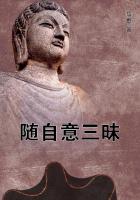In various islands of the Pacific, for both the reasons above specified, the name of the reigning chief is so rigorously "tabu," that common words and even syllables resembling that name in sound must be omitted from the language. In New Zealand, where a chiefs name was Maripi, or "knife," it became necessary to call knives nekra; and in Tahiti, fetu, "star,"had to be changed into fetia, and tui, "to strike," became tiai, etc., because the king's name was Tu. Curious freaks are played with the languages of these islands by this ever-recurring necessity. Among the Kafirs the women have come to speak a different dialect from the men, because words resembling the names of their lords or male relatives are in like manner "tabu." The student of human culture will trace among such primeval notions the origin of the Jew's unwillingness to pronounce the name of Jehovah; and hence we may perhaps have before us the ultimate source of the horror with which the Hebraizing Puritan regards such forms of light swearing--"Mon Dieu," etc.--as are still tolerated on the continent of Europe, but have disappeared from good society in Puritanic England and America. The reader interested in this group of ideas and customs may consult Tylor, Early History of Mankind, pp. 142, 363; Max Muller, Science of Language, 6th edition, Vol. II. p. 37; Mackay, Religious Development of the Greeks and Hebrews, Vol. I. p. 146.
Chamisso's well-known tale of Peter Schlemihl belongs to a widely diffused family of legends, which show that a man's shadow has been generally regarded not only as an entity, but as a sort of spiritual attendant of the body, which under certain circumstances it may permanently forsake. It is in strict accordance with this idea that not only in the classic languages, but in various barbaric tongues, the word for "shadow" expresses also the soul or other self. Tasmanians, Algonquins, Central-Americans, Abipones, Basutos, and Zulus are cited by Mr. Tylor as thus implicitly asserting the identity of the shadow with the ghost or phantasm seen in dreams; the Basutos going so far as to think "that if a man walks on the river-bank, a crocodile may seize his shadow in the water and draw him in." Among the Algonquins a sick person is supposed to have his shadow or other self temporarily detached from his body, and the convalescent is at times "reproached for exposing himself before his shadow was safely settled down in him." If the sick man has been plunged into stupor, it is because his other self has travelled away as far as the brink of the river of death, but not being allowed to cross has come back and re-entered him. And acting upon a similar notion the ailing Fiji will sometimes lie down and raise a hue and cry for his soul to be brought back. Thus, continues Mr. Tylor, "in various countries the bringing back of lost souls becomes a regular part of the sorcerer's or priest's profession."[164] On Aryan soil we find the notion of a temporary departure of the soul surviving to a late date in the theory that the witch may attend the infernal Sabbath while her earthly tabernacle is quietly sleeping at home. The primeval conception reappears, clothed in bitterest sarca**, in Dante's reference to his living contemporaries whose souls he met with in the vaults of hell, while their bodies were still walking about on the earth, inhabited by devils.
[164] Tylor, Primitive Culture, I. 394. "The Zulus hold that a dead body can cast no shadow, because that appurtenance departed from it at the close of life." Hardwick, Traditions, Superstitions, and Folk-Lore, p. 123.
The theory which identifies the soul with the shadow, and supposes the shadow to depart with the sickness and death of the body, would seem liable to be attended with some difficulties in the way of verification, even to the dim intelligence of the savage. But the propriety of identifying soul and breath is borne out by all primeval experience. The breath, which really quits the body at its decease, has furnished the chief name for the soul, not only to the Hebrew, the Sanskrit, and the classic tongues; not only to German and English, where geist, and ghost, according to Max Muller, have the meaning of "breath," and are akin to such words as gas, gust, and geyser; but also to numerous barbaric languages.
Among the natives of Nicaragua and California, in Java and in West Australia, the soul is described as the air or breeze which passes in and out through the nostrils and mouth; and the Greenlanders, according to Cranz, reckon two separate souls, the breath and the shadow. "Among the Seminoles of Florida, when a woman died in childbirth, the infant was held over her face to receive her parting spirit, and thus acquire strength and knowledge for its future use..... Their state of mind is kept up to this day among Tyrolese peasants, who can still fancy a good man's soul to issue from his mouth at death like a little white cloud."[165] It is kept up, too, in Lancashire, where a well-known witch died a few years since;"but before she could 'shuffle off this mortal coil' she must needs TRANSFER HER FAMILIAR SPIRIT to some trusty successor.
An intimate acquaintance from a neighbouring township was consequently sent for in all haste, and on her arrival was immediately closeted with her dying friend. What passed between them has never fully transpired, but it is confidently affirmed that at the close of the interview this associate RECEIVED THE WITCH'S LAST BREATH INTO HER MOUTH AND WITH ITHER FAMILIAR SPIRIT. The dreaded woman thus ceased to exist, but her powers for good or evil were transferred to her companion; and on passing along the road from Burnley to Blackburn we can point out a farmhouse at no great distance with whose thrifty matron no neighbouring farmer will yet dare to quarrel."[166]
[165] Tylor, op. cit. I. 391.
[166] Harland and Wilkinson, Lancashire Folk-Lore, 1867, p.
210.













